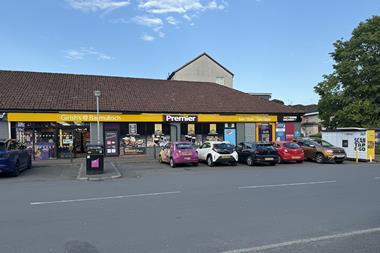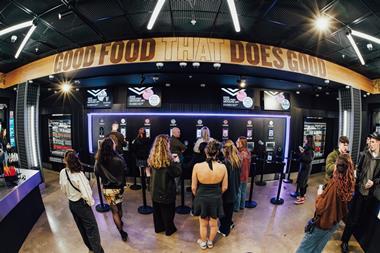Stonegate’s ingenious marketing has added serious value to eggs, says Elaine Watson
Fast, furious and passionate. What a partner!’ boasts the public relations material that goes out to retailers and producers from Stonegate Farmers - the world’s largest packer of free range and organic eggs.
So maybe he sexed up the marketing spiel a bit, admits MD Michael Kent. But there’s nothing gratuitous about it. Indeed, spend a couple of hours at Stonegate’s state-of-the-art egg packing plant in Lacock, Wiltshire, and chances are you will emerge convinced there is something pretty exciting, if not downright sexy, about eggs.
One thing they’re not, insists Kent, is a commodity. Buy eggs 15 years ago, he points out, and pretty much the only choice available was small, medium or large. Wander around Waitrose - to which Stonegate is now sole supplier - and you can pick your preferred breed of hen; your favourite farming method; and even the diet of choice for the hens in question before you start worrying about whether size matters.
“The egg is one of the finest engineered products around,” enthuses Kent, who has a background in the sciences and a reputation for coming up with new and ingenious ways to add value to the egg. “There are so many options now - it’s just a question of communicating this to the consumer.” Abandoning his boyhood plans to become a surgeon, Kent swapped a place at Guy’s Hospital for a business finance degree and learned the trade at top egg packer Deans Foods. By 1984, he was ready to go it alone, bought his parents’ egg business and developed Horizon Farms. In 1994, he sold Horizon’s packing and marketing business to Stonegate, only to return five years later to take a controlling stake in Stonegate after the company ran into financial difficulties.
Packing sites were rationalised, investment pumped into IT and innovation, and customer accounts scrutinised to ensure each could stand on its own two feet. A year later, the company walked away with the International Egg Council’s Millennium Egg Marketing Award, beating off competition from 27 countries.
With Stonegate firmly back in the black in 2001, Kent was back on the acquisition trail, this time picking up egg packer Thames Valley Foods, which was losing £3m a year on a £55m turnover. First, packing activities across the combined companies were consolidated into three sites and liquid egg pasteurising sites cut from three to one.
Then came the new kit: automated egg sorting, weighing, grading and packing equipment plus machines able to take battery eggs straight from cages into retail packs sold by minimum weight.
By April 2002, Thames Valley too, was back in black and Kent could focus on what he does best, adding value to the humble egg.
This is essential, both to keep consumers interested and to maintain a viable business in an industry where margins are notoriously slim, he says. “Net margins can be anything between a loss and 2-3%. We are at the upper end of that, but want to at least double that figure in the next two to three years.”
Battery eggs still represent 70% of the market, and Kent can churn them out at the lowest unit cost. But the money, and the future, is in free range, barn, organic and speciality eggs, which account for more than half of Stonegate’s £110m sales and substantially more of its profits.
And this is why it has all of Waitrose’s business, 75% of Asda’s and substantial accounts with Sainsbury and Aldi, says Kent.
To persuade consumers to trade up in the egg fixture, you can focus on the end product, as Stonegate has done with ranges such as Intelligent Eating, eggs rich in essential fatty acids by feeding hens highly refined tuna oil. Or you can focus on the hens and let consumers know how well you are looking after them, says Kent, who also owns farms with three million hens.
Most importantly, you can print photos onto packs, showing consumers exactly what they can do with an egg and some inspiration, he says. “Eggs are the ultimate in fast food. But they are also a fresh, natural product - and a very cheap meal.”
Consolidating sites
Fast, furious and passionate. What a partner!’ boasts the public relations material that goes out to retailers and producers from Stonegate Farmers - the world’s largest packer of free range and organic eggs.
So maybe he sexed up the marketing spiel a bit, admits MD Michael Kent. But there’s nothing gratuitous about it. Indeed, spend a couple of hours at Stonegate’s state-of-the-art egg packing plant in Lacock, Wiltshire, and chances are you will emerge convinced there is something pretty exciting, if not downright sexy, about eggs.
One thing they’re not, insists Kent, is a commodity. Buy eggs 15 years ago, he points out, and pretty much the only choice available was small, medium or large. Wander around Waitrose - to which Stonegate is now sole supplier - and you can pick your preferred breed of hen; your favourite farming method; and even the diet of choice for the hens in question before you start worrying about whether size matters.
“The egg is one of the finest engineered products around,” enthuses Kent, who has a background in the sciences and a reputation for coming up with new and ingenious ways to add value to the egg. “There are so many options now - it’s just a question of communicating this to the consumer.” Abandoning his boyhood plans to become a surgeon, Kent swapped a place at Guy’s Hospital for a business finance degree and learned the trade at top egg packer Deans Foods. By 1984, he was ready to go it alone, bought his parents’ egg business and developed Horizon Farms. In 1994, he sold Horizon’s packing and marketing business to Stonegate, only to return five years later to take a controlling stake in Stonegate after the company ran into financial difficulties.
Packing sites were rationalised, investment pumped into IT and innovation, and customer accounts scrutinised to ensure each could stand on its own two feet. A year later, the company walked away with the International Egg Council’s Millennium Egg Marketing Award, beating off competition from 27 countries.
With Stonegate firmly back in the black in 2001, Kent was back on the acquisition trail, this time picking up egg packer Thames Valley Foods, which was losing £3m a year on a £55m turnover. First, packing activities across the combined companies were consolidated into three sites and liquid egg pasteurising sites cut from three to one.
Then came the new kit: automated egg sorting, weighing, grading and packing equipment plus machines able to take battery eggs straight from cages into retail packs sold by minimum weight.
By April 2002, Thames Valley too, was back in black and Kent could focus on what he does best, adding value to the humble egg.
This is essential, both to keep consumers interested and to maintain a viable business in an industry where margins are notoriously slim, he says. “Net margins can be anything between a loss and 2-3%. We are at the upper end of that, but want to at least double that figure in the next two to three years.”
Battery eggs still represent 70% of the market, and Kent can churn them out at the lowest unit cost. But the money, and the future, is in free range, barn, organic and speciality eggs, which account for more than half of Stonegate’s £110m sales and substantially more of its profits.
And this is why it has all of Waitrose’s business, 75% of Asda’s and substantial accounts with Sainsbury and Aldi, says Kent.
To persuade consumers to trade up in the egg fixture, you can focus on the end product, as Stonegate has done with ranges such as Intelligent Eating, eggs rich in essential fatty acids by feeding hens highly refined tuna oil. Or you can focus on the hens and let consumers know how well you are looking after them, says Kent, who also owns farms with three million hens.
Most importantly, you can print photos onto packs, showing consumers exactly what they can do with an egg and some inspiration, he says. “Eggs are the ultimate in fast food. But they are also a fresh, natural product - and a very cheap meal.”
Consolidating sites













No comments yet